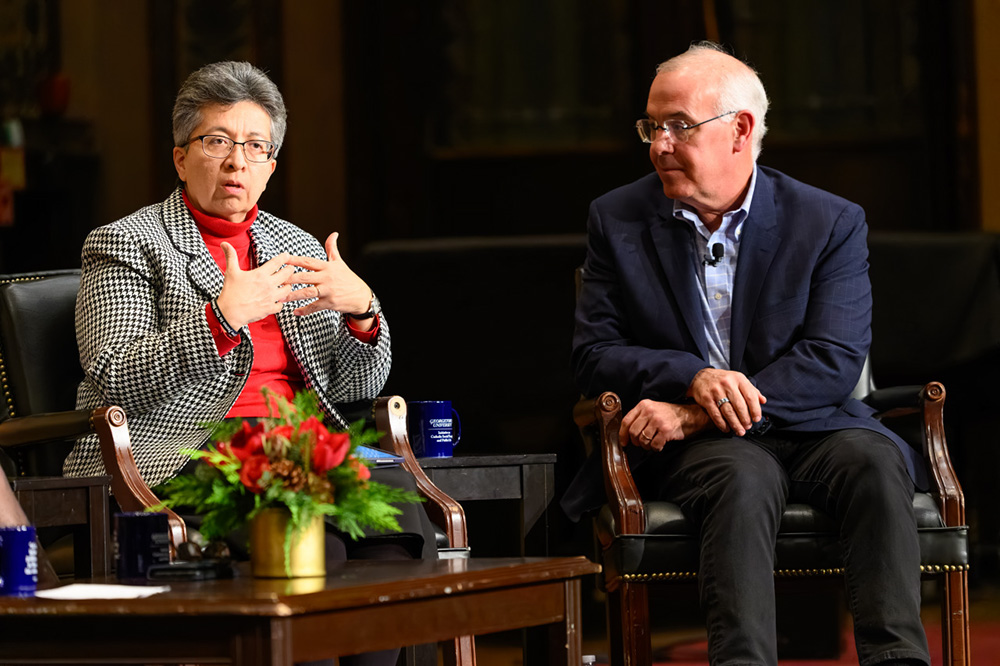
The New York Times columnist and Sr. Teresa Maya of the Congregation of the Sisters of Charity of the Incarnate Word in San Antonio, during the Dec. 10 public dialogue hosted by the Initiative on Catholic Social Thought and Public Life at Georgetown University in Washington, D.C. (Courtesy of Georgetown University/Rafael Suanes)
Resisting President-elect Donald Trump's campaign promise to begin a mass deportation program of undocumented immigrants will be "the crucial fight over the next several months" for Catholics and people of faith, New York Times columnist David Brooks said during a recent public dialogue at Georgetown University.
Brooks also sought to give some hope and perspective in reminding his audience that Trump, even with his hardline rhetoric and partisanship, is still susceptible to public opinion like all politicians.
"Donald Trump believes what he believes and says what he says, but he also likes to be popular," Brooks said. "And in my view, if he starts deporting families who've been in this country for decades and America rises up, he will see his popularity fall and he will say, 'Maybe that wasn't a good idea.' "
Brooks, a contributor to The Atlantic and a commentator on PBS Newshour, offered his thoughts during a panel discussion hosted by Georgetown University's Initiative on Catholic Social Thought and Public Life.
The dialogue sought to explore how key principles of Catholic social thought can offer an affirmative path forward in the wake of a bitterly contested national election that underscored the nation's political divisions amid a time of intense polarization.
"No matter who is president, no matter who controls Congress, our mission remains. It's Jesus' mission, to bring good news to the poor, liberty to the captives, new sight to the blind, and set the downtrodden free. It is our mission to share the principles of Catholic social teaching," said John Carr, the founder of the Initiative on Catholic Social Thought and Public Life.
Advertisement
The public dialogue, which was held Dec. 10, featured commentary focusing on how Catholic social principles such as solidarity, especially with marginalized immigrant communities, can chart a hopeful path forward in the coming months.
"It's very important. First of all, we have to remember we are a church of immigrants, for immigrants, with immigrants. We need to stand with them," said Sr. Teresa Maya of the Congregation of the Sisters of Charity of the Incarnate Word in San Antonio.
Maya, the senior director of theology and sponsorship at the Catholic Health Association of the United States, said the Catholic Church in the United States has to be a true universal church that "speaks many languages." She spoke of the anxieties coursing through many immigrant communities amid Trump's promises to begin mass deportations "on Day 1."
"I pray every Sunday that if something ever happens to that community, that the rest of us will really stand up," Maya said. "That's when we're going to know what our moral fiber is all about."
Kim Daniels, the director of the Initiative on Catholic Social Thought and Public Life who moderated the dialogue, said the need to show solidarity with migrants marked "another opportunity for witness for the Catholic community, in particular here on this issue."
The dialogue also featured participants Kerry Robinson, president and CEO of Catholic Charities USA, which has been criticized by some conservative voices for its humanitarian assistance on behalf of undocumented migrants, and Vincent Rougeau, president of the College of the Holy Cross in Worcester, Massachusetts.






